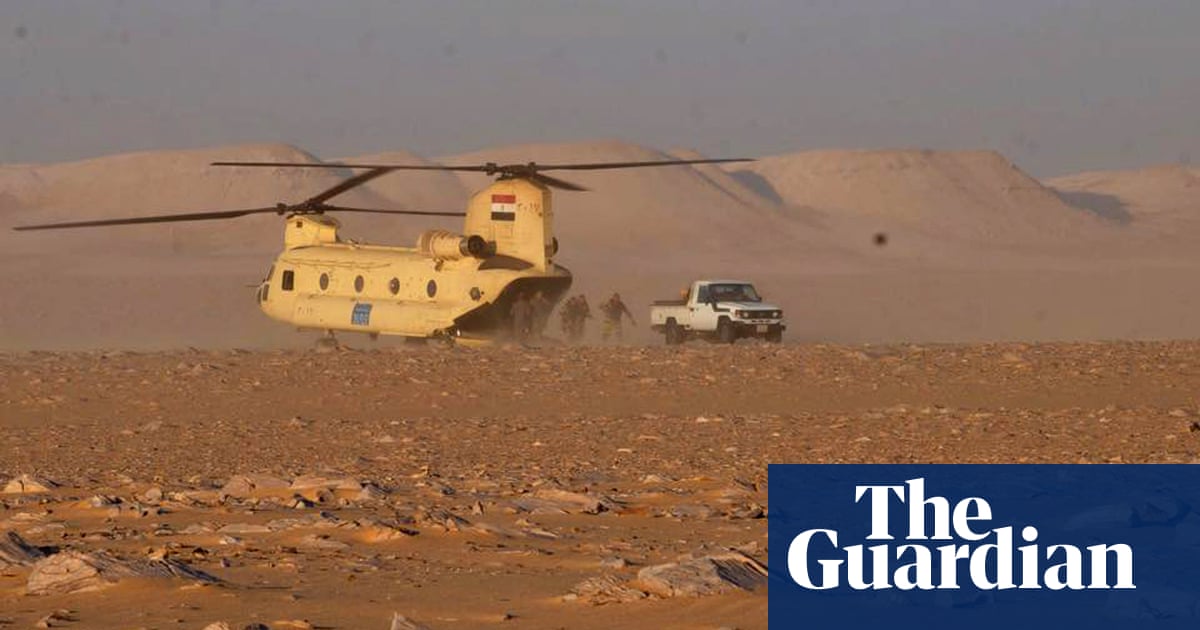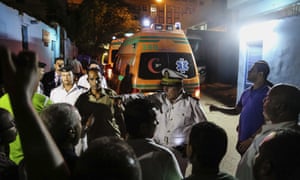April Corley was with a tour group when military fired upon them with rockets. Now shes asking the US to halt the sale of more weaponry to Egypt

A US woman who survived an attack by the Egyptian military on a group of tourists is now fighting to prevent the sale of the US-made weaponry that left her permanently scarred.
April Corley from San Diego and her Mexican boyfriend Rafael Bejarano were traveling with a tour group in Egypts White Desert in September 2015 when they were attacked by Egyptian military, who later claimed they mistook the group for jihadist militants.
I was doing cartwheels in the sand, Rafael was taking pictures of me. Then all of a sudden it felt like I was thrown to the ground, and Rafael wasnt near me any more. There was just black, black all over the sand, she said.
Corley described how the tourists scrambled for shelter as an Apache attack helicopter circled overhead, firing at them with rockets and 30mm machine guns for several hours even while their guides desperately waved a white flag.
I played dead, she said, describing how the helicopters returned to fire on the group for several hours, even though a member of the Egyptian tourist police was traveling with the tour vehicles which were marked with logos from the their travel company.
I thought if I get hit one more time, Ill need to be taken out as I wont survive these injuries, said Corley. They just kept coming back around, again and again, and shooting. They wanted to wipe everything out.

When the attack finally ended, Bejarano, his mother and six other Mexican tourists were lying dead, along with four of their Egyptian guides.
Corley is now seeking to draw attention to the deadly consequences of American weaponry used on foreign soil.
The United States supplies Egypt with an average of $1.3bn in annual military aid, and Corley and her lawyers are pressuring Donald Trump to raise her case when the countrys president, Abdel Fatah al-Sisi, visits Washington next week.
Corley has called on the US to deny Egypt the $1bn sale of a further 10 Apache AH-64E helicopters, arguing that the attack is a stark example of misuse of weapons made by the US manufacturer Boeing. Its not what their designs were intended for, she said.
The 40-year-old former pilates instructor and professional rollerblader sustained injuries that doctors say she will never fully recover from. Ammunition broke her shoulder, collarbone, arm and ribs, tore off parts of her skin and ripped muscle from her bones; she still suffers from debilitating post-traumatic stress disorder. I was not trained for war, she said.
The Egyptian government has offered her $150,000 in compensation, far short of the over $14m that Corley and her lawyers say would cover her ongoing medical bills and lifelong loss of earnings.
On a visit to Cairo in January, the secretary of state, Mike Pompeo, asserted in a speech that the United States is a force for good, in the Middle East.
The United States released $195m in military aid to Egypt last July, which had previously been withheld due to human rights concerns. But in a leaked memo, Pompeo demanded the aid be released despite adding that the overall human rights climate in Egypt continues to deteriorate, and that officials accused of abuse are not held accountable.
Lawmakers have increasingly taken up Corleys case as an example of why the US should reassess military aid to Egypt. After 46 members of Congress wrote a letter to Pompeo expressing concern over Egypts use of American weapons, the 2019 fiscal appropriations bill demands that the United States reduce annual military aid to Egypt to $1bn, and withhold a further $300m until Egypt has improved its human rights record.
Pompeo has until mid-April to report back on Corleys bid for compensation.
Aprils plight is proof that Egypt is unwilling or unable to meet its obligations to protect and prioritize human rights, said Jared Genser, Corleys legal counsel, in a white paper detailing her case. Sisi has failed to hold members of his security forces responsible to our knowledge, Egypt has failed even to credibly investigate the attack.

The Egyptian foreign minister, Sameh Shoukry, initially described the attack as regrettable, and promised a full investigation, despite few public indications this took place. Reporting on the incident was quickly banned in the local media.
Egypt later blamed the travel agency which oversaw the trip, claiming it took the group to a restricted area, although they were accompanied by a police escort, and carrying the required permits to pass through military checkpoints on a route regularly used by tourists.
The Egyptian Travel Agents Association, a quasi-government body, agreed in 2016 to pay compensation to the relatives of at least three deceased victims of the attack, reportedly in exchange for their agreeing to drop any legal proceedings against Egypt. A spokesman for Egypts ministry of foreign affairs did not respond to repeated requests for comment when contacted by the Guardian.
Tour groups now travel the same route that Corley took to the Bahariya Oasis, despite the lack of assurances from the Egyptian authorities that anything has changed. Corley, meanwhile, is unable to work and lives with constant trauma, and fear that she is under attack.
After all of these mistakes and the misuse of weapons, there needs to be accountability. They need to show they have done they work to make it safe, she said.
Read more: https://www.theguardian.com/world/2019/apr/01/egypt-military-tourist-attack-white-desert


Recent Comments